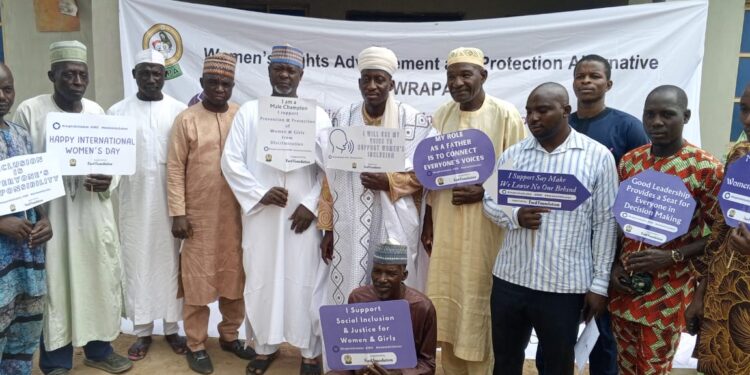Prosper Okoye
The Women’s Rights Advancement and Protection Alternative (WRAPA) has sensitized male stakeholders in Karonmajigi community, Abuja, on the need to ensure women’s inclusion in all facets of social life.
The sensitization is part of WRAPA’s activities to commemorate this year’s International Women’s Day, with the theme: “Inspire Inclusion.”
According to WRAPA’s Communications Officer, Habiba Ahmed, there was a need to educate the men and boys so that they can join in advocating for the inclusion of women in all socio-economic and political matters.
“Advocacy for inclusion does not have to be limited to the higher level, where we discuss gender-based policies. It needs to extend to the community level to help them grasp inclusion within the family structure, inclusion within the market and other public spaces, and also address inclusion as leaders of faith and culture within the community,” she explained.
Ms. Ahmed said WRAPA aimed to create a Nigerian society through its various community engagements where women will be involved in decision-making not just at the national level but also at the palace, at the local government level, and even in family affairs.
“We are challenging the traditional notion that men are the final decision-makers; we want to change this narrative!” she declared.
The event, held at the Karubiyi Village head palace, provided an opportunity for women to express their grievances, and for stakeholders to find solutions to them.
Speaking to newsmen, Chief Dauda Dogo expressed gratitude for the assistance provided by WRAPA in raising awareness about the issues facing women.
“Before WRAPA intervened, we faced numerous challenges, but their collaboration significantly reduced these issues.
“We’ve made efforts in terms of addressing violence against our girl children and ensuring their access to education. We convened leaders from various sectors—faith, youth, and women—and tasked them with disseminating knowledge to help bring an end to these challenges,” he said.
Chief Dauda acknowledged that marital abuses still remained a dominant issue within the community. “Poverty remains a major driver of this problem,” he noted.
He called on the federal government and the Ministry of Women Affairs to address the issues promoting women discrimination.
On her part, the Woman Community Leader, Amina Musa, said some of the men inhibited their wives from engaging in productive activities because of their cultural belief that women should be subject to men.
She thanked WRAPA for the engagement. “We hope our men were enlightened and will henceforth ensure that women do not face any form of discrimination,” Amina added.
Also speaking, a community religious leader, Imam Umar Khidir, said the women and men must learn to live together, as both cannot live without each other.
“If a man is given his right, and the woman is not, then there would be no peace. They are supposed to be loving, patient, and helpful to each other.”
























